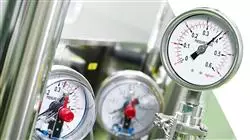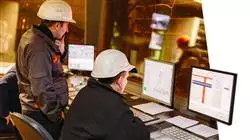University certificate
The world's largest faculty of engineering”
Introduction to the Program
With this 100% online program, you will be able to master the laws of Thermodynamics in only 12 weeks”

Thanks to the contributions of Carnot, Mayer, Joule, Clausius or Kelvin in the development of the concepts, functions and laws of Thermodynamics, means of transport, hydraulic turbines, refrigerators and solar panels have emerged. All of these inventions make efficient use of energy. One of the main objectives of every engineering professional is to know how to optimize energy economically and environmentally for human purposes, whether generating electricity, heating or combustion.
That is why mastering the concepts and calculations necessary to apply Thermodynamics properly is essential to achieve success in industrial projects, in the design of new equipment or machinery. Given this reality, TECH has created this Postgraduate certificate in Thermodynamics, which offers the graduates the most advanced knowledge of this science in just 12 weeks.
A program where students will be able to delve into the mathematical tools that are essential to apply Thermodynamics, the keys to calorimetry, gases or magnetic systems. Furthermore, the innovative pedagogical resources of this program will lead students to delve in a much more dynamic way into the concepts of collectivity, the different types and to acquire basic notions of the Ising model.
A teaching with a theoretical but at the same time practical approach, which will lead the graduates to solve problems in the field of Thermodynamics. This will be possible thanks to the case studies, provided by the teaching team specialized in this field, which are part of this instruction.
Therefore, engineering professionals are facing an excellent opportunity to advance in their career thanks to a Postgraduate certificate, which they can study comfortably whenever and wherever they wish. All that is required is an electronic device (computer, tablet or cell phone) with Internet connection to access, at any time, the syllabus hosted on the virtual platform. In addition, with the Relearning system, students will be able to advance through the program content in a much more natural way and even reduce the long hours of study.
Gain the knowledge you need to efficiently solve any thermodynamic problem”
This Postgraduate certificate in Thermodynamics contains the most complete and up-to-date program on the market. The most important features include:
- Practical case studies are presented by experts in Physics
- The graphic, schematic and practical contents with which it is designed provide advanced and practical information on those disciplines that are essential for professional practice
- Practical exercises where self-assessment can be used to improve learning
- Its special emphasis on innovative methodologies
- Theoretical lessons, questions to the expert, debate forums on controversial topics, and individual reflection assignments
- Content that is accessible from any fixed or portable electronic device with an Internet connection
Access the most advanced knowledge about Thermodynamics and the differences between boson and baryon statistics”
The program’s teaching staff includes professionals from sector who contribute their work experience to this educational program, as well as renowned specialists from leading societies and prestigious universities.
Its multimedia content, developed with the latest educational technology, will provide the professional with situated and contextual learning, i.e., a simulated environment that will provide an immersive education programmed to learn in real situations.
The design of this program focuses on Problem-Based Learning, by means of which the professionals must try to solve the different professional practice situations that are presented throughout the program. For this purpose, the student will be assisted by an innovative interactive video system created by renowned experts.
Enroll now in a 100% online university program that is compatible with the most demanding professional responsibilities"

Thanks to this Postgraduate certificate, you will perfectly understand the Joule, Boyle-Mariotte, Charles, Gay-Lussac, Dalton or Mayer laws"
Syllabus
The video summaries, videos in detail, schemes or complementary readings make up the library of multimedia resources to which the students of this program will have access. Thanks to them, they will be able to delve into the main mathematical concepts, laws, functions and theories that make up Thermodynamics. Theoretical and practical knowledge that will lead you to obtain the necessary learning to be able to advance firmly in your career in the field of Engineering.

Enroll now in a program that allows you to access its content 24 hours a day, using any electronic device with internet connection”
Module 1. Thermodynamics
1.1. Mathematical Tools: Review
1.1.1. Review of the Logarithm and Exponential Functions
1.1.2. Review of Derivatives
1.1.3. Integrals
1.1.4. Derivative of a Function of Several Variables
1.2. Calorimetry. Zero Principle in Thermodynamics
1.2.1. Introduction and General Concepts
1.2.2. Thermodynamic Systems
1.2.3. Zero Principle in Thermodynamics
1.2.4. Temperature Scales. Absolute Temperature
1.2.5. Reversible and Irreversible Processes
1.2.6. Sign Criteria
1.2.7. Specific Heat
1.2.8. Molar Heat
1.2.9. Phase Changes
1.2.10. Thermodynamic Coefficients
1.3. Thermodynamic Work. First Principle of Thermodynamics
1.3.1. Heat and Thermodynamic Work
1.3.2. State Functions and Internal Energy
1.3.3. First Principle of Thermodynamics
1.3.4. Work of a Gas System
1.3.5. Joule’s Law
1.3.6. Heat of Reaction and Enthalpy
1.4. Ideal Gases
1.4.1. Ideal Gas Laws
1.4.1.1. Boyle-Mariotte’s Law
1.4.1.2. Charles and Gay-Lussac’s Laws
1.4.1.3. Equation of State of Ideal Gases
1.4.1.3.1. Dalton’s Law
1.4.1.3.2. Mayer’s Law
1.4.2. Calorimetric Equations of the Ideal Gas
1.4.3. Adiabatic Processes
1.4.3.1. Adiabatic Transformations of an Ideal Gas
1.4.3.1.1. Relationship between Isotherms and Adiabatics
1.4.3.1.2. Work in Adiabatic Processes
1.4.5. Polytropic Transformations
1.5. Real Gases
1.5.1. Motivation
1.5.2. Ideal and Real Gases
1.5.3. Description of Real Gases
1.5.4. Equations of State of Series Development
1.5.5. Van der Waals Equation and Series Development
1.5.6. Andrews Isotherms
1.5.7. Metastable States
1.5.8. Van der Waals Equation: Consequences
1.6. Entropy
1.6.1. Introduction and Objectives
1.6.2. Entropy: Definition and Units
1.6.3. Entropy of an Ideal Gas
1.6.4. Entropic Diagram
1.6.5. Clausius Inequality
1.6.6. Fundamental Equation of Thermodynamics
1.6.7. Carathéodory’s Theorem
1.7. Second Principle of Thermodynamics
1.7.1. Second Principle of Thermodynamics
1.7.2. Transformations between Two Thermal Focuses
1.7.3. Carnot Cycle
1.7.4. Real Thermal Machines
1.7.5. Clausius Theorem
1.8. Thermodynamic Functions. Third Principle of Thermodynamics
1.8.1. Thermodynamic Functions
1.8.2. Thermodynamic Equilibrium Conditions
1.8.3. Maxwell’s Equations
1.8.4. Thermodynamic Equation of State
1.8.5. Internal Energy of a Gas
1.8.6. Adiabatic Transformations in a Real Gas
1.8.7. Third Principle of Thermodynamics and Consequences
1.9. Kinetic-Molecular Theory of Gases
1.9.1. Hypothesis of the Kinetic-Molecular Theory
1.9.2. Kinetic Theory of the Pressure of a Gas
1.9.3. Adiabatic Evolution of a Gas
1.9.4. Kinetic Theory of Temperature
1.9.5. Mechanical Argument for Temperature
1.9.6. Principle of Equipartition of Energy
1.9.7. Virial Theorem
1.10. Introduction to Statistical Mechanics
1.10.1. Introduction and Objectives
1.10.2. General Concepts
1.10.3. Entropy, Probability and Boltzmann’s Law
1.10.4. Maxwell-Boltzmann Distribution Law
1.10.5. Thermodynamic and Partition Functions
Module 2. Advanced Thermodynamics
2.1. Formalism of Thermodynamics
2.1.1. Laws of Thermodynamics
2.1.2. The Fundamental Equation
2.1.3. Internal Energy: Euler’s Form
2.1.4. Gibbs-Duhem Equation
2.1.5. Legendre Transformations
2.1.6. Thermodynamic Potentials
2.1.7. Maxwell’s Relations for a Fluid
2.1.8. Stability Conditions
2.2. Microscopic Description of Macroscopic Systems I
2.2.1. Microstates and Macrostates: Introduction
2.2.2. Phase Space
2.2.3. Collectivities
2.2.4. Microcanonical Collectivity
2.2.5. Thermal Equilibrium
2.3. Microscopic Description of Macroscopic Systems II
2.3.1. Discrete Systems
2.3.2. Statistical Entropy
2.3.3. Maxwell-Boltzmann Distribution
2.3.4. Pressure
2.3.5. Effusion
2.4. Canonical Collectivity
2.4.1. Partition Function
2.4.2. Ideal Systems
2.4.3. Energy Degeneration
2.4.4. Behavior of the Monoatomic Ideal Gas at a Potential
2.4.5. Energy Equipartition Theorem
2.4.6. Discrete Systems
2.5. Magnetic Systems
2.5.1. Thermodynamics of Magnetic Systems
2.5.2. Classical Paramagnetism
2.5.3. ½ Spin Paramagnetism
2.5.4. Adiabatic Demagnetization
2.6. Phase Transitions
2.6.1. Classification of Phase Transitions
2.6.2. Phase Diagrams
2.6.3. Clapeyron Equation
2.6.4. Vapor-Condensed Phase Equilibrium
2.6.5. The Critical Point
2.6.6. Ehrenfest’s Classification of Phase Transitions
2.6.7. Landau’s Theory
2.7. Ising’s Model
2.7.1. Introduction
2.7.2. One-Dimensional Chain
2.7.3. Open One-Dimensional Chain
2.7.4. Mean Field Approximation
2.8. Real Gases
2.8.1. Comprehensibility Factor. Virial Development
2.8.2. Interaction Potential and Configurational Partition Function
2.8.3. Second Virial Coefficient
2.8.4. Van der Waals Equation
2.8.5. Lattice Gas
2.8.6. Corresponding States Law
2.8.7. Joule and Joule-Kelvin Expansions
2.9. Photon Gas
2.9.1. Boson Statistics vs. Fermion Statistics
2.9.2. Energy Density and Degeneracy of States
2.9.3. Planck Distribution
2.9.4. Equations of State of a Photon Gas
2.10. Macrocanonical Collectivity
2.10.1. Partition Function
2.10.2. Discrete Systems
2.10.3. Fluctuations
2.10.4. Ideal Systems
2.10.5. The Monoatomic Gas
2.10.6. Vapor-Solid Equilibrium

Upon completion of this program, you will have a complete mastery of the laws of Thermodynamics and their application in the field of engineering”
Postgraduate Certificate in Thermodynamics
Thermodynamics is a branch of physics that deals with the study of energy, its transfer and transformation. It is a fundamental science that allows us to understand the functioning of energy systems in the world around us and its application in numerous areas of industry and technology. At TECH Global University, we offer a Postgraduate Certificate in Thermodynamics that will allow you to acquire the knowledge and skills necessary to understand energy processes and their application in everyday life. With this course, you will be able to understand the relationship between heat and work, the law of conservation of energy and the different forms of energy, from mechanical to chemical. You will be able to apply your knowledge in areas such as electric power production, building air conditioning, refrigeration and the food industry, among many others.
Discover how energy works in the world around us and learn how to control it.
TECH Global University is a leading institution in technological education, which focuses on providing innovative and quality study programs that respond to the needs of the labor market. In the Postgraduate Certificate in Thermodynamics, you will have a team of professors who are experts in the field, as well as an innovative teaching methodology that combines theory and practice in an interactive and personalized learning environment. With this course, you will be able to acquire the skills and competencies necessary to develop a career in areas related to energy and engineering, and become an expert in thermodynamics. Don't miss the opportunity to understand energy and dominate the world with the Postgraduate Certificate in Thermodynamics.







